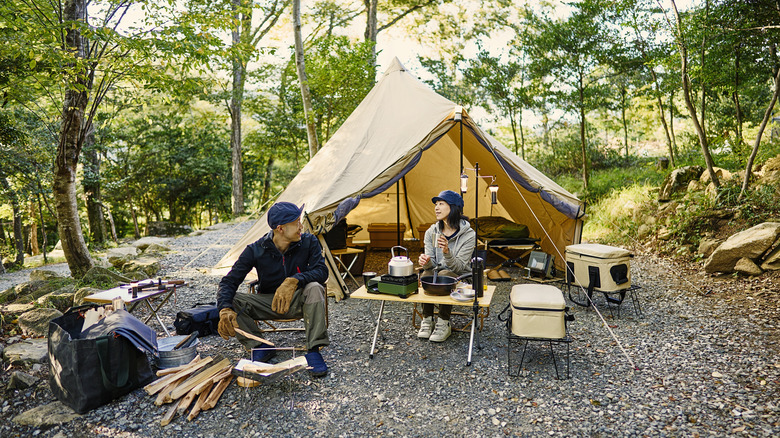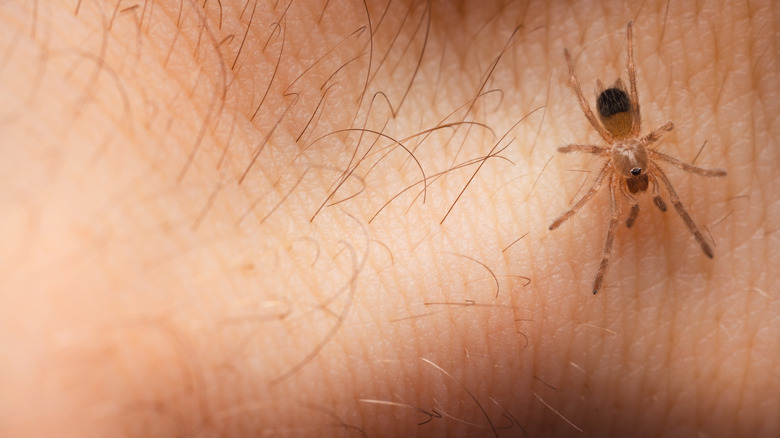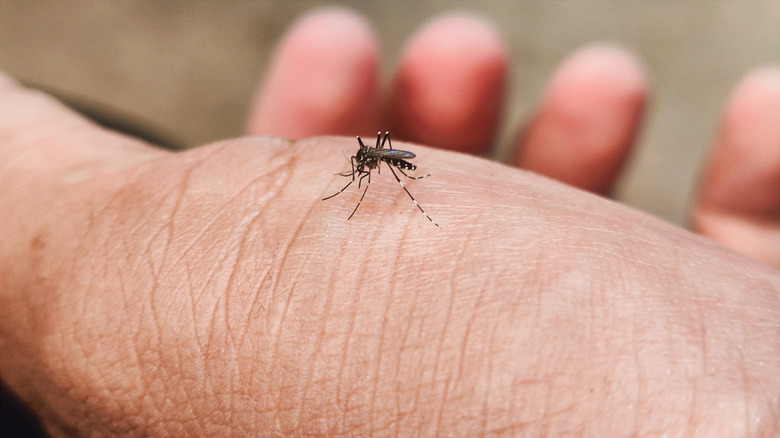Spider Bites Vs. Mosquito Bites: How To Tell Them Apart On Your Next Camping Trip
Whether at a local campground or in the backcountry, camping is all about getting closer to nature. But sometimes, nature gets a little too close to you — like when you're bitten by a spider or a mosquito. If you've ever woken up in your tent with an itchy or painful bump, then you understand how frustrating the experience can be, especially when you can't seem to make out which insect has bitten you. The good news is, you can identify a spider or a mosquito bite as long as you know what to look for.
Although the bites may look similar at first glance, they actually don't behave the same way. Mosquito bites can cause itching or irritation, while spider bites can be tender and sometimes painful. Knowing the difference early can go a long way in knowing the best action to take, so you don't have to let your mind scurry through a maze of panic and worry. Paying attention to some visual cues and taking note of how your body reacts might just be all you need to solve the mystery — and to avoid any possible health hazards during your vacation.
Knowing what a spider bite looks and feels like
Because spiders typically have fangs, technically known as chelicerae (pronounced "kaliseree"), their bites may create two tiny holes on the skin. The affected area may be slightly swollen, reddish, or splotchy, depending on the kind of spider and the response from your body. After a spider bite, the spot may become sore, rather than itchy (or sometimes both). Burning or stinging is another common feeling, and may even get worse after a period of time. Some bites can in fact grow into blisters or ulcers, particularly from venomous spiders, like the brown recluse. It's very important to know that while many spider bites are not dangerous and may go away on their own, bites from specific types of spiders — such as black widows, brown recluses, or hobo spiders — require medical attention because of their venom. Always see a doctor if you're bitten by one of these.
If you notice symptoms like fever, nausea, weakness, chills, muscle, joint, or chest pain, or difficulty breathing (all of which are common with venomous bites), then it's best to seek professional medical help without delay. Such symptoms can lead to serious complications if ignored. It can also be very helpful to snap a photo of the affected spot, and of the spider, if you can. Consult a medical expert if you're ever in doubt. Overall, nonvenomous spider bites can be treated by cleaning the wound and using hydrocortisone cream, applying ice to ease swelling, or taking antihistamines in case of itching.
What a mosquito bite looks and feels like
One classic complaint among campers? Mosquito bites. When these flying menaces bite your skin, the area typically looks red and round. But that's not all: it can be really itchy too, either right away or after some hours. You might also notice some small bumps on your skin. These generally depend on how your body reacts.
When a mosquito bites you, your body reacts to the proteins present in the mosquito's saliva. This is what causes the itchy sensation. Note that scratching isn't the solution, even though it can be tempting and oddly enjoyable to do it. The downside is that scratching may further irritate your skin, increase your symptoms, or even cause an infection if you break the skin, especially if your hands are unclean from outdoor activities. If you're wondering how to treat your mosquito bite, antihistamines or over-the-counter creams may come in handy. Still, the discomfort is usually short-lived for most people.
Worthy of note: Bites from some scary species of mosquitoes can sometimes be more than itchy, as they may lead to diseases like West Nile virus, dengue fever, or malaria in areas where such mosquitoes are present. So make sure to always check for helpful information regarding the destinations you may be visiting, and choose your campsite carefully. Bringing along bug repellents that include lemon eucalyptus oil, deet, or icaridin is just one genius way to keep bugs away while camping. Similarly, wearing long sleeves, socks, and generally keeping yourself well-covered may be helpful as well.


